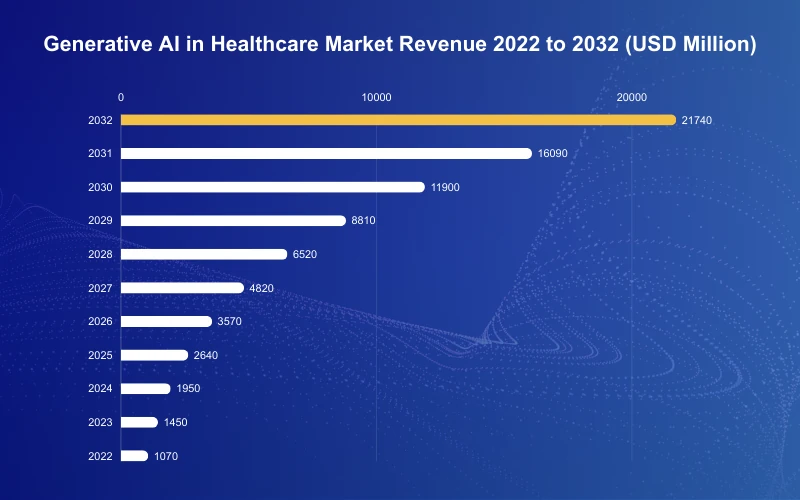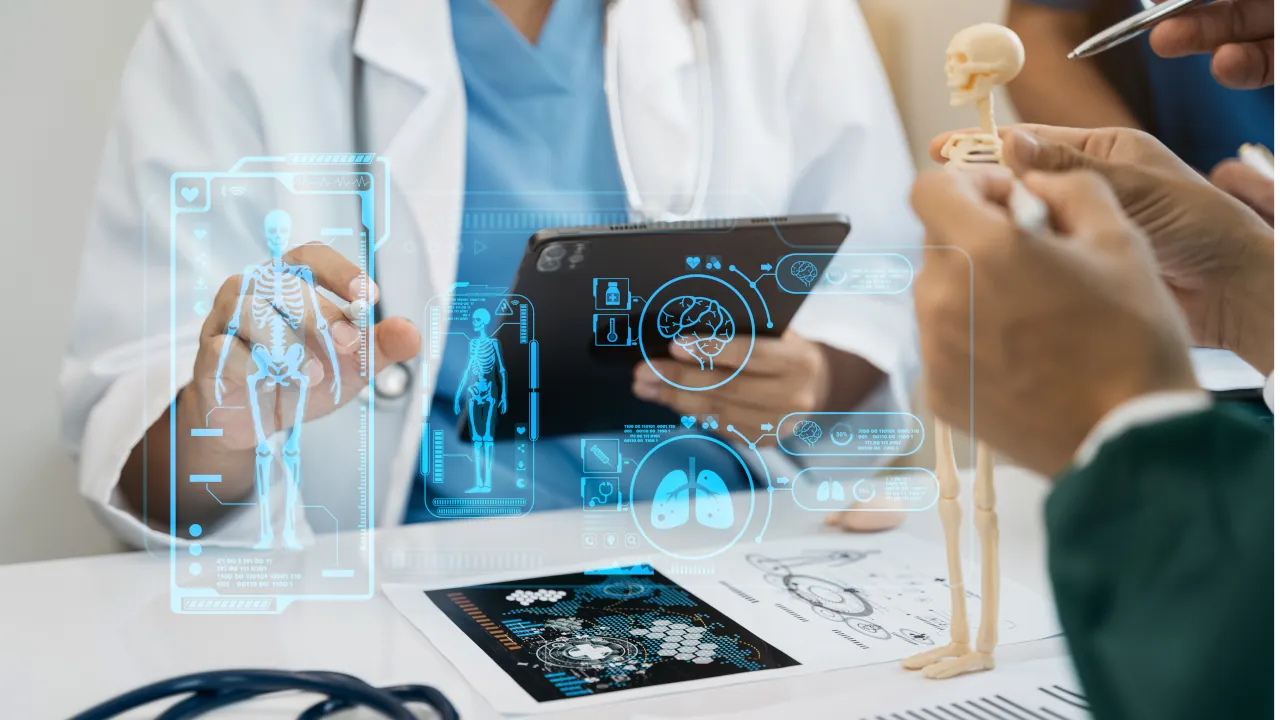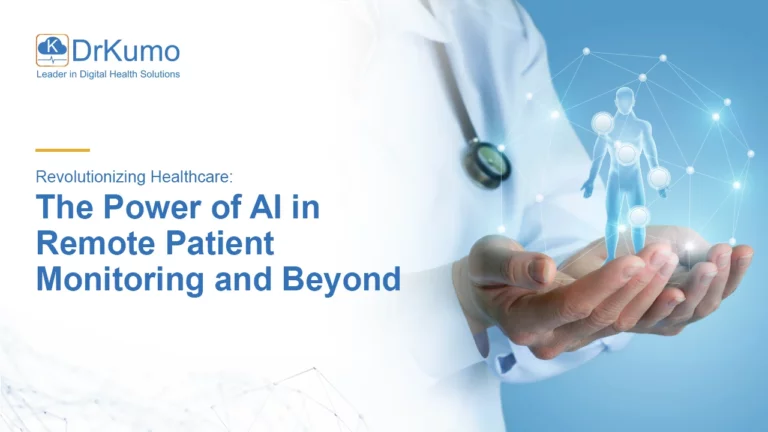In today’s rapidly evolving world, technology continues to reshape various industries, and healthcare is no exception. One of the most groundbreaking advancements in recent years is the integration of Artificial Intelligence (AI) in healthcare systems. AI has the potential to revolutionize the way we approach patient care, diagnostics, and treatment plans. In this article, we’ll delve into the transformative power of AI in healthcare and explore its numerous benefits. Additionally, we’ll let you explore with our comprehensive guide to remote patient monitoring, highlighting how AI-driven solutions like RPM are shaping the future of healthcare delivery.
The Explosive Growth of Generative AI in Healthcare Market by 2032
According to a report from finance.yahoo.com, the global market for generative AI in healthcare, which was estimated at $1,070 million in 2022, is forecasted to surge to around $21,740 million by the year 2032. This significant growth is anticipated to occur at a compound annual growth rate (CAGR) of 35.1% during the period from 2023 to 2032. AI, or Artificial Intelligence, in healthcare refers to the use of advanced computer algorithms and data analytics to improve various aspects of medical care and administration. Essentially, AI enables machines to process and interpret vast amounts of healthcare-related data, including patient records, medical images, and clinical notes, in order to assist healthcare providers in making more accurate diagnoses, formulating treatment plans, and managing administrative tasks efficiently. This technology has the potential to revolutionize the healthcare industry by augmenting human capabilities and improving the quality and efficiency of patient care.

Importance of Exploring Its Benefits
The exploration of AI benefits in healthcare is critical due to the transformative potential it holds for improving patient outcomes and healthcare delivery. By harnessing AI technology, healthcare providers can enhance diagnostic accuracy, personalize treatment plans, streamline administrative tasks, and optimize resource allocation. Moreover, AI has the capability to address healthcare challenges such as reducing medical errors, improving patient access to care, and managing healthcare costs. Therefore, understanding and leveraging the benefits of AI in healthcare is essential for advancing medical practices and ensuring better healthcare experiences for patients.
The critical role of delving into AI’s advantages in healthcare
- Transformative potential: AI’s exploration is pivotal, promising significant improvements in patient outcomes and the efficiency of healthcare services.
- Enhancement of diagnostic precision: Leveraging AI enables healthcare practitioners to significantly improve the accuracy of diagnoses.
- Personalization of care: AI facilitates the customization of treatment plans tailored to the individual health profiles of patients.
- Streamlining operations: Through AI, the efficiency of administrative functions is greatly enhanced, contributing to smoother healthcare operations.
- Optimization of resources: AI technologies play a crucial role in the judicious allocation and utilization of healthcare resources.
Addressing healthcare challenges
- Minimizing medical errors: AI offers solutions to reduce errors, thereby enhancing patient safety.
- Expanding patient care access: It breaks barriers, ensuring more patients can access the care they need promptly.
- Healthcare cost management: AI is a tool for controlling and potentially reducing the escalating costs associated with healthcare delivery.
- Advancement of medical practices: The integration of AI into healthcare is a steppingstone towards modernizing medical practices and protocols.
- Enhancing patient experiences: Ultimately, the application of AI in healthcare is about enriching the healthcare journey for patients, making it more efficient, personalized, and accessible.
Improved Diagnostics and Disease Detection
One of the most profound benefits of AI is its ability to enhance diagnostic accuracy and personalize treatment plans. Imagine a world where X-rays and MRIs are interpreted with superhuman precision, catching diseases in their earliest, most treatable stages. This isn’t a distant dream—it’s happening now, with AI algorithms identifying nuances in medical images that the human eye might miss.
Artificial Intelligence has ushered in a new era of diagnostics and disease detection, offering unparalleled accuracy and efficiency. AI algorithms, powered by machine learning and deep learning techniques, can analyze vast amounts of patient data including medical images, electronic health records, and genetic information. By identifying subtle patterns and anomalies in these data sets, AI can assist healthcare providers in making more timely and precise diagnoses.
For example, AI-powered imaging technologies have significantly enhanced the interpretation of medical images such as X-rays, MRIs, and CT scans, leading to earlier detection of diseases such as cancer, cardiovascular conditions, and neurological disorders.
AI algorithms for accurate diagnosis
AI algorithms play a pivotal role in enhancing diagnostic accuracy by analyzing complex medical data and identifying patterns or anomalies indicative of various health conditions. These algorithms utilize advanced machine learning techniques to sift through extensive patient data, including medical images, genetic information, and electronic health records, enabling healthcare providers to make more informed and timely diagnoses. By leveraging AI-driven diagnostic tools, healthcare professionals can achieve higher accuracy rates, leading to improved patient outcomes and more effective treatment strategies.
Early detection of diseases
AI-enabled diagnostic tools facilitate the early detection of diseases by analyzing patient data and identifying subtle indicators or risk factors associated with specific medical conditions. This early detection enables healthcare providers to intervene promptly and initiate treatment plans at the earliest stages of disease progression, ultimately improving patient outcomes and reducing the overall burden of illness.
By leveraging AI technology for early disease detection, healthcare systems can minimize the impact of diseases on patients’ health and well-being, leading to better long-term prognosis and quality of life.
Personalized Treatment Plans
The concept of personalized medicine has gained traction in recent years, and AI plays a pivotal role in its realization. By leveraging patient-specific data such as genetic profiles, medical histories, and lifestyle factors, AI algorithms can generate tailored treatment plans that are optimized for individual patients. This approach, known as precision medicine, holds tremendous promise for improving patient outcomes and reducing the likelihood of adverse reactions to treatment. For instance, AI-driven decision support systems can analyze genetic data to identify targeted therapies for cancer patients based on their unique genetic mutations, leading to more effective and personalized treatment regimens.
AI is tailoring treatment plans to the individual, leveraging genetic data to predict how different patients will respond to various treatments. This precision medicine approach means treatments are more effective, with fewer side effects, tailored to you and your unique genetic blueprint.
Tailored treatment options
AI technology enables the development of tailored treatment options by analyzing individual patient data, including genetic profiles, medical histories, and lifestyle factors, to customize treatment plans based on specific patient needs and characteristics. This personalized approach, known as precision medicine, allows healthcare providers to deliver more targeted and effective treatments that optimize therapeutic outcomes while minimizing adverse effects. By leveraging AI-driven precision medicine approaches, healthcare professionals can tailor treatment regimens to each patient’s unique physiology, genetic makeup, and disease characteristics, resulting in improved treatment efficacy and patient satisfaction.
Precision medicine with AI
Precision medicine, facilitated by AI technology, involves tailoring medical treatments and interventions to individual patient characteristics, such as genetic makeup, biomarkers, and lifestyle factors. By leveraging advanced algorithms and data analytics, AI enables healthcare providers to analyze vast amounts of patient data and identify specific genetic mutations or biomarkers associated with certain diseases. This information allows for the development of personalized treatment plans that target the underlying mechanisms of disease, resulting in more effective and targeted therapies. Through precision medicine approaches supported by AI, healthcare professionals can optimize treatment outcomes, minimize adverse effects, and improve patient care across various medical specialties.
Enhanced Patient Care
AI-powered tools have revolutionized patient care by enabling remote monitoring and proactive interventions. Remote patient monitoring systems equipped with AI algorithms can continuously track patients’ vital signs, medication adherence, and other health metrics in real-time, allowing healthcare providers to intervene promptly if any abnormalities are detected.
Moreover, predictive analytics powered by AI can forecast potential health issues and alert healthcare providers to take preventive measures, ultimately improving patient outcomes and reducing healthcare costs. For example, AI-driven predictive models can identify patients at high risk of hospital readmissions or complications, enabling targeted interventions to prevent adverse events and optimize resource utilization.
Beyond the clinic and hospital, AI is revolutionizing patient care through remote monitoring and telehealth. Wearable technologies track your health data in real-time, offering a window into your well-being from the comfort of your home. Virtual health assistants provide a new level of patient engagement, offering reminders, health tips, and even emotional support.
Remote patient monitoring
Remote patient monitoring, facilitated by AI-powered technologies, involves the continuous tracking and monitoring of patient health metrics and vital signs from a distance. By leveraging wearable devices, sensors, and mobile applications, AI enables healthcare providers to remotely monitor patients’ health status in real-time, allowing for early detection of health issues and timely interventions. This proactive approach to patient care not only improves patient outcomes but also enhances patient engagement and satisfaction by enabling individuals to actively participate in their own healthcare management from the comfort of their homes.
Predictive analytics for proactive care
Predictive analytics, driven by AI technology, involves the analysis of historical patient data to forecast future health outcomes and identify individuals at high risk of developing certain medical conditions. By leveraging advanced algorithms and machine learning techniques, predictive analytics enable healthcare providers to proactively intervene and implement preventive measures to mitigate potential health risks before they escalate. This proactive approach to care not only improves patient outcomes but also reduces healthcare costs by minimizing the need for emergency interventions and hospitalizations.
Streamlined Administrative Tasks
In addition to clinical applications, AI also offers significant benefits in streamlining administrative tasks within healthcare systems. Automated documentation systems powered by natural language processing (NLP) can accurately transcribe clinical notes and medical records, saving healthcare providers valuable time and reducing the risk of errors.
Furthermore, AI-driven resource management tools optimize hospital operations by predicting patient admissions, managing staff schedules, and allocating resources efficiently. For example, AI-powered scheduling algorithms can match patient appointments with the availability of healthcare providers and resources, minimizing wait times and maximizing operational efficiency.
Automated documentation
Automated documentation, powered by AI-driven systems, involves the automated generation and management of clinical notes, medical records, and administrative documents within healthcare settings. By leveraging natural language processing (NLP) and machine learning algorithms, AI automates the transcription and documentation process, saving healthcare providers valuable time and reducing the risk of errors associated with manual documentation. This streamlining of administrative tasks improves operational efficiency and enables healthcare professionals to focus more time and attention on patient care, ultimately enhancing overall productivity and satisfaction.
Efficient resource management
Efficient resource management, facilitated by AI-driven tools and algorithms, involves the optimization of healthcare resources, including staff, equipment, and facilities, to ensure optimal patient care delivery. By leveraging predictive analytics and machine learning algorithms, AI enables healthcare organizations to forecast patient demand, optimize staffing levels, and allocate resources efficiently based on anticipated patient needs. This proactive approach to resource management improves healthcare delivery, reduces wait times, and enhances patient satisfaction by ensuring that resources are allocated where they are most needed, leading to better patient outcomes and experiences.
Ethical Considerations and Challenges
While the benefits of AI in healthcare are undeniable, it’s essential to address ethical considerations and challenges associated with its implementation. Privacy concerns surrounding patient data security must be carefully addressed to ensure patient confidentiality and compliance with regulatory standards.
Additionally, efforts must be made to ensure fairness and transparency in AI algorithms to prevent bias and discrimination in healthcare decisions. Ethical guidelines and regulatory frameworks must be established to govern the responsible and ethical use of AI in healthcare, safeguarding patient rights and ensuring equitable access to AI-driven healthcare technologies.
Privacy concerns
The implementation of AI in healthcare raises privacy concerns related to the collection, storage, and use of patient data. As AI systems rely on vast amounts of patient information to train algorithms and generate insights, ensuring the privacy and security of patient data is paramount to maintain patient trust and compliance with regulatory standards. Healthcare organizations must implement robust data protection measures, including encryption, access controls, and data anonymization techniques, to safeguard patient confidentiality and prevent unauthorized access or data breaches.
Additionally, healthcare providers must adhere to strict regulatory guidelines, such as the Health Insurance Portability and Accountability Act (HIPAA), to ensure the ethical and legal handling of patient data. By prioritizing patient privacy and implementing robust security measures, healthcare organizations can build trust with patients and stakeholders while leveraging the benefits of AI technology to improve patient care and outcomes.
Ensuring fairness and transparency in AI algorithms
Fairness and transparency in AI algorithms are essential to mitigate biases and ensure equitable healthcare outcomes. AI algorithms may inadvertently perpetuate biases present in the data used for training, leading to unfair treatment or disparities in healthcare delivery. It’s crucial for healthcare organizations to implement measures to identify and mitigate biases in AI algorithms, such as algorithmic auditing and validation processes.
Additionally, transparency in AI algorithms involves providing explanations and insights into the decision-making process, enabling healthcare providers and patients to understand how AI-driven recommendations are generated. By prioritizing fairness and transparency in AI algorithms, healthcare organizations can uphold ethical standards and ensure equitable access to healthcare services for all patients.
Future Perspectives and Innovations
Looking ahead, the future of AI in healthcare holds immense potential for further advancements and innovations. Continued research and development in AI-driven technologies are expected to expand the scope of applications in areas such as drug discovery, genomics, and predictive modeling. As AI continues to evolve, its impact on the healthcare industry and society will be profound, paving the way for more efficient, effective, and personalized healthcare solutions. However, it’s crucial to remain vigilant and address emerging ethical, legal, and societal implications to ensure responsible and equitable integration of AI in healthcare.
Potential advancements in AI healthcare
The future of AI in healthcare holds immense potential for further advancements and innovations. Continued research and development in AI-driven technologies are expected to expand the scope of applications in areas such as drug discovery, genomics, and predictive modeling. AI-powered virtual assistants and chatbots may enhance patient engagement and support personalized healthcare interventions.
Furthermore, advancements in AI-driven robotics and automation may revolutionize surgical procedures and patient care delivery in hospitals and clinics. As AI continues to evolve, its impact on healthcare is expected to be profound, leading to more efficient, effective, and personalized healthcare solutions that benefit patients and providers alike.
Impact on healthcare industry and society
The impact of AI in healthcare extends beyond clinical settings to influence the entire healthcare industry and society. AI-driven technologies have the potential to improve healthcare delivery, reduce healthcare costs, and enhance patient experiences, ultimately leading to better health outcomes and improved quality of life for individuals worldwide.
Furthermore, AI has the potential to address healthcare disparities by improving access to care, particularly in underserved communities. However, the widespread adoption of AI in healthcare also raises ethical, legal, and societal implications that must be carefully addressed to ensure responsible and equitable implementation.
Transforming Healthcare Delivery with DrKumo Remote Patient Monitoring: Harnessing the Power of AI for Proactive Care
DrKumo Remote Patient Monitoring (RPM) serves as a pivotal bridge between the transformative benefits of AI in healthcare and practical implementation. By harnessing the power of AI algorithms, DrKumo RPM offers an innovative solution for remote patient monitoring, revolutionizing the way healthcare is delivered. Through sophisticated data analytics and machine learning, DrKumo RPM enables healthcare providers to continuously track and monitor patients’ vital signs and health metrics in real-time, regardless of their location.
This seamless integration of AI technology with remote patient monitoring not only enhances the accuracy and efficiency of healthcare delivery but also facilitates early detection of health issues and proactive care management. By analyzing vast amounts of patient data collected through DrKumo RPM, healthcare providers can identify subtle patterns and anomalies indicative of potential health concerns, allowing for timely interventions and personalized treatment plans.
Furthermore, DrKumo RPM contributes to the advancement of precision medicine by providing tailored treatment options based on individual patient characteristics and health data. This precision-driven approach optimizes treatment efficacy and minimizes adverse effects, ultimately improving patient care outcomes and enhancing overall patient satisfaction.
Frequently Asked Questions
What is AI in healthcare?
AI in healthcare refers to the use of artificial intelligence technologies, including machine learning and natural language processing, to analyze health data, assist in diagnoses, personalize treatment, and improve various aspects of patient care and administrative processes.
How does AI improve diagnostic accuracy?
AI improves diagnostic accuracy by analyzing medical images, such as X-rays and MRIs, with high precision, identifying patterns and anomalies that may be missed by the human eye. This leads to earlier detection of diseases and more accurate diagnoses.
Can AI personalize patient treatment plans?
Yes, AI can personalize treatment plans by analyzing a patient’s genetic information and other health data to predict how they will respond to different treatments. This allows for precision medicine tailored to the individual’s unique health profile.
How does AI enhance operational efficiency in healthcare?
AI enhances operational efficiency by automating administrative tasks, such as scheduling and patient record management, and optimizing clinical workflows, such as emergency room prioritization and hospital bed management, thereby reducing costs and improving service delivery.
What role does AI play in patient care outside the hospital?
AI plays a significant role in remote patient monitoring and telehealth, using wearable technology and virtual health assistants to track health data and engage with patients outside traditional healthcare settings, improving accessibility and ongoing care.
How is AI being used in mental health care?
AI is used in mental health care to provide support through chatbots, analyze speech and text for signs of mental health issues, and offer personalized therapy recommendations, making mental health support more accessible and effective.
What are the benefits of AI in drug development?
AI accelerates drug development by rapidly analyzing vast datasets to identify potential therapeutic compounds and predict their effectiveness, significantly reducing the time and cost associated with bringing new drugs to market.
What are the challenges of implementing AI in healthcare?
The main challenges include ensuring data privacy and security, addressing potential biases in AI algorithms, navigating regulatory and compliance issues, and maintaining transparency and explainability in AI-driven decisions.
How will AI change the future of healthcare?
AI will make healthcare more efficient, effective, and personalized, with advancements in diagnosis, treatment, and patient care. It will also foster the integration of emerging technologies and reshape the role of healthcare professionals.
Are there ethical concerns with using AI in healthcare?
Yes, ethical concerns include the need to protect patient data privacy, prevent bias in AI algorithms, ensure equitable access to AI-enhanced healthcare, and maintain transparency in AI-driven healthcare decisions to foster trust and accountability.
Key Takeaways
The transformative power of AI in healthcare is evident in its ability to revolutionize patient care, diagnostics, and treatment plans. By leveraging AI-driven technologies, healthcare providers can improve patient outcomes, enhance the quality of care, and optimize operational efficiency within healthcare systems. However, it’s crucial to address ethical considerations and challenges to ensure responsible and equitable implementation of AI in healthcare. As we embrace the potential of AI, we must continue to prioritize patient well-being and uphold the highest standards of ethical conduct in healthcare delivery.
As we look towards the future, it’s imperative to harness the power of AI to revolutionize healthcare delivery and provide better outcomes for patients worldwide. By embracing AI technology and investing in research and development, healthcare organizations can unlock the full potential of AI in healthcare and pave the way for a brighter and healthier future for all. It’s essential for healthcare providers, policymakers, and stakeholders to collaborate and prioritize the responsible integration of AI in healthcare to ensure equitable access to high-quality care and improve health outcomes for individuals and communities globally.
Join us in transforming healthcare by integrating DrKumo’s AI-powered Remote Patient Monitoring technology, ensuring every patient benefits from precise, proactive, and personalized care, no matter where they are. Contact us today!
Disclaimer: This article, “Unveiling the Transformative Power: Benefits of AI in Healthcare,” serves as informational and educational content only and does not constitute medical advice. The potential benefits of AI in healthcare discussed are influenced by various factors and may not apply universally.








